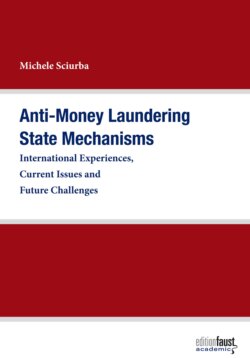Читать книгу Anti-Money Laundering State Mechanisms - Michele Sciurba - Страница 11
На сайте Литреса книга снята с продажи.
I.4.1 The USA Patriot Act’s Effect on Financial Institutions
ОглавлениеSection 311 of the Patriot Act has added section 5318A USC to the BSA, expanding it to include five measures with extraterritorial effect that, in case of money laundering, empower the US authorities to oblige foreign jurisdictions, institutions or financial institutions to provide: (1) additional records or reports of specific financial transactions; (2) the identities of foreign beneficial owners of certain bank accounts; (3) the identities of customers of a foreign bank conducting interbank transactions via “payable through” accounts; and (4) the identities of foreign bank customers who use correspondence accounts in interbank transactions. In addition, the US authorities may restrict or prohibit the establishment or maintenance of certain interbank correspondent or “payable through” accounts.44 Section 313 of the Patriot Act has implemented the subsection (j) in the USC Title 31 §531845, prohibiting US financial institutions, security brokers, and dealers from opening or managing correspondence accounts of foreign shell banks. This measure closed another gap to prevent potential terrorist financing. Accordingly, the shell company Bank al-Taqwa based in the Bahamas was identified as financing terrorism in November 2001.46 The Patriot Act now provides a comprehensive list of potential terrorist financiers who are denied access to the US financial market.47
Section 314 of the Patriot Act encouraged the exchange of information among investigating authorities and financial institutions with regard to terrorist acts or money laundering activities, lifting any liability of financial institutions and their employees in the event of information disclosure to the authorities. The provisions of section 314 are, therefore, in clear conflict with the provisions of the RTPA 1978 and the Gramm-Leach-Bliley Financial Modernization Act 199948. The latter already prohibits the transfer of customer information among financial institutions for marketing reasons.49 The Patriot Act suspends the core provisions of the RTFP 1978 for investigations of US authorities that are concerned with international terrorism.50 Under section 352 of the Patriot Act, the FinCEN is responsible for the exchange of information amongst financial institutions and law enforcement agencies as well as the monitoring of the implementation of AML programs in financial institutions.51 Coupled with the AML/CTF risk-based approach (RBA), these new information requirements for US financial institutions have resulted in an estimated annual cost of USD 10 billions in the US.52 Section 317 of the Patriot Act has provided notably more opportunities to the US courts to freeze and confiscate foreign assets in the US related to AML/CTF offences. The strict requirements of the AML regime in the US apply even to travel agencies due to expansion of the definition of financial institutions in section 318 of the Act.53 By resolution of a US court, section 319 of the Act now allows the US authorities to seize deposits from a foreign bank, if a terrorist has funds on this bank and a correspondent account in the US.54
